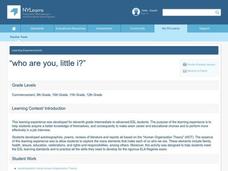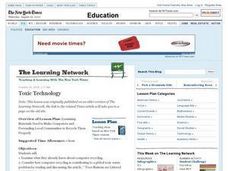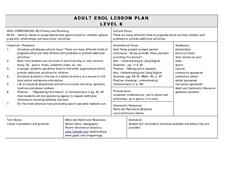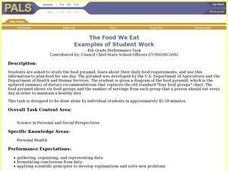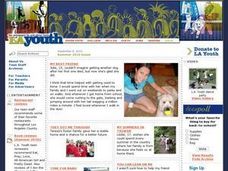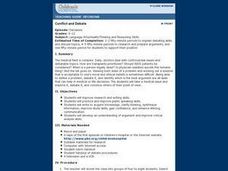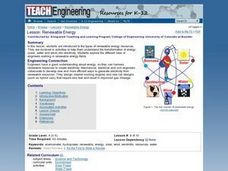Curated OER
Who Are You?
Students explore the concept of self and analyze the Human Organization Theory. Individually, students write poems about themselves. In small groups, they create a poster related to the 14 categories of the Human Organization Theory....
Curated OER
Save the Earth: It's Everyone's Home!
Students demonstrate how to make earth-smart choices. In this environmental awareness lesson, students listen to a short lecture on environmentally friendly products. Students invent an environmentally friendly product and complete an...
Curated OER
Aristotle
In this online interactive philosophy worksheet, students respond to 10 short answer and essay questions about Aristotle. Students may check some of their answers on the interactive worksheet.
Curated OER
Dirty Air And Bright Lights
Students are asked to think about their use of electricity, particularly around the holidays, and how it affects their quality of life and the lives of all of us. They explore the issue by tracing the connections and discussing how and...
Curated OER
Biology: New Trials & Findings
Students use background knowledge to summarize articles about skin cancer research and present them to the class and place their studies along a clinical study timeline. They are introduced to clincal trails and to various aspects of...
Curated OER
TOXIC TECHNOLOGY
Students examine what they already know about computer recycling and cconsider how computer recycling is contributing to a global toxic waste problem by reading and discussing the article, ""Poor Nations are Littered With Old PC's,...
Curated OER
Controlling Substances
Students consider their own understanding of household safety, examine the latest remedy deemed poisonous by physicians, and research the hazards of household products. They create public service announcements regarding potential hazards.
Curated OER
Getting Up the Nerve
Students examine the basics of the nervous system through an interactive program. They discover how the brain is linked to muscle movement. They can test cells through the interactive program to see how it reacts to different stimuli.
Curated OER
Life Science: Human Body Skit
Learners create skits based on the human body systems. Working in groups, they role-play as organs in the various systems. They make costumes or wear signs identifying themselves as the organs in their skits.
Curated OER
ADULT ESOL LESSON PLAN--Level 6--Family and Parenting
Students, after defining/reviewing an extensive list of vocabulary terms on the board, discuss and explore acceptable and unacceptable parenting skills with a variety of disciplinary practices to assist them.
Curated OER
Religion and Ethics: Living with Special Needs
Students explore human behavior by exploring mental and physical disabilities. In this learning disability activity, students identify the different disabilities students have which prevent them from working at the same pace as the rest...
Curated OER
Doing the Right Thing
Students consider the payoffs of doing the right thing. In this philanthropy lesson, students examine the virtue of courage in Jackie Robinson's life and in their own.
Curated OER
The Food We Eat
Young scholars plan a menu for one day after they study the food pyramid and learn about their daily food requirements. They are given an updated food pyramid with a summary fo dietary recommendations that replaces the old standard...
Curated OER
Let's Go Camping!
Students view and use visual texts to gain and present information, become familiar with and use appropriate technologies eg. publish writing on computer, use photographs to record events, use video to record events.
Curated OER
Digitized Doctoring
Students explore new medical technologies to exhibit in an Amazing Medical Machines technology fair. They research different types of advanced medical technologies; then create posters to summarize findings and present at a mock medical...
Curated OER
What's in a Willow?
Students study of nutritional value of edible native plants. discriminate between foods that have nutritional value and those that do not. They relate how food can affect how they think, feel, and perform.
Curated OER
Do Medicines Grow on Trees and Plants?
Students study the importance of preserving rainforest. They investigate the uses of rainforest plants for medicinal uses by participating in rainforest immersion activities.
Curated OER
Through Thick and Thin: Examining the Dynamics of Friendship Relationships
Young scholars read one teen's story of dealing with her best friend's anorexia to explore the dynamics of friendship relationships and the qualities needed to sustain a friendship through challenges.
Curated OER
America's Underwater Treasures Viewing Guide
Young scholars complete a worksheet while watching a video about how humans affect the ocean environment. They discover the need for a practice of balancing fisheries and their fishing practices. They examine how scientists use data to...
Curated OER
Conflict and Debate
Learners take a medical issue and explore it, debate it, and convince others of their point of view. They improve research skills and writing skills. Students are able to define a problem, debate it, and identify which is the best...
Curated OER
The ADA, the Supreme Court, and Self-Advocacy
Students study the role the Supreme Court plays in laws and decisions that affect individuals with disabilities and examine the policies of the American with Disabilities Act. They draw parallels between policies enacted by the ADA and...
Curated OER
TE Lesson: Renewable Energy
Students examine renewable energy sources such as solar, water, and wind. They experiment to determine how renewable energy is transformed into electricity. They investigate the role of engineers who work in the field of renewable energy.
Curated OER
TE Activity: The Beat Goes On
Students determine what the pulse is before examining how to measure the heart rate in different situations. They build a simple device that measures the heart rate, take heart rates, and record them on a worksheet. They discuss how...
Curated OER
Waste Management
Learners investigate the amount of trash they generate, the problems that result and possible solutions.They complete four activities regarding household trash, biodegradability, packaging, and recycling.
